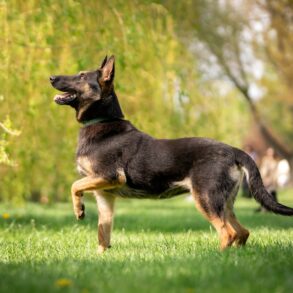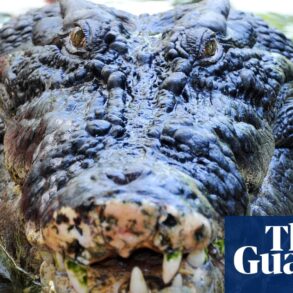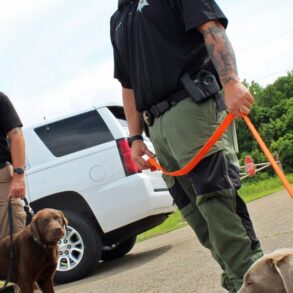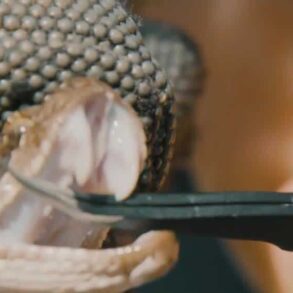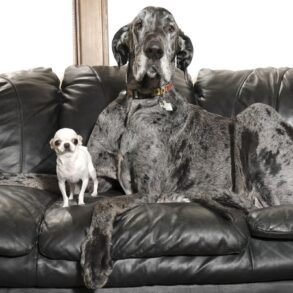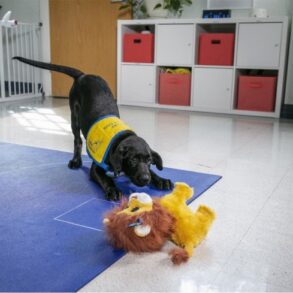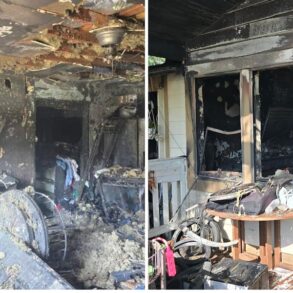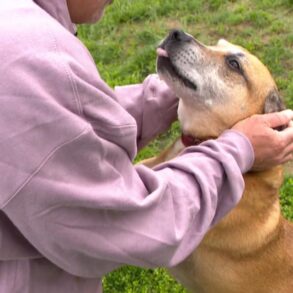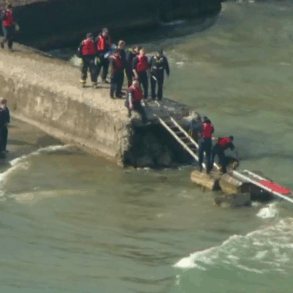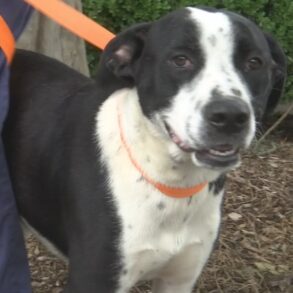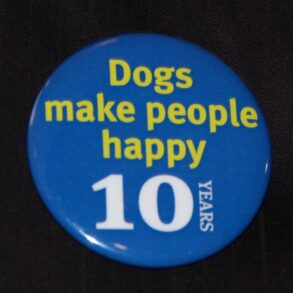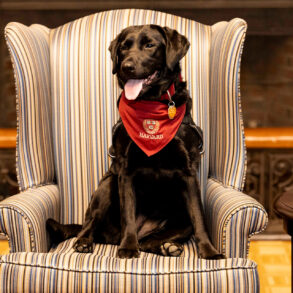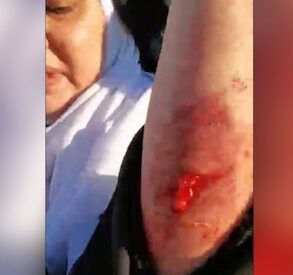Warning: This story contains graphic images and content involving animal cruelty.
The frozen semen of dogs with fighting bloodlines is being sold to overseas buyers for what experts say is thousands of dollars, as an ABC investigation reveals international links between the illegal blood sport and Australia.
The shadowy, underground world of dog fighting is highly lucrative, and experts say it’s often linked to other organised crime.
Those in the know are careful about who they let into their inner circle, so obtaining evidence of suspected involvement is difficult.
A kennel in eastern Thailand boasted of this dog’s pedigree and its Australian blood. (Supplied)
But an ABC investigation has uncovered the sale of dogs from fighting lineages both domestically and internationally.
In one case, a kennel bragged that frozen semen was sent from Australia to Thailand to breed a fighting dog, before it was sent to the Philippines to compete against an “international champion”.
The global trade of fighting dogs and their bloodlines remains a serious issue — as does dog fighting, according to the RSPCA’s Queensland office.
“Australians may be shocked to learn the extent of these operations,”
a spokesperson said.
“These fights continue to operate in secret, often in rural or isolated locations, making enforcement challenging.”
Dogs purpose-bred from fighting bloodlines
A thick chain drags from a dog’s neck as it walks in circles around a yard in eastern Thailand.
Bolted to the ground, the dog has no choice but to walk the same short route.
Loading…
Online, the kennel that raised him boasts of the dog’s pedigree and its Australian blood.
“[The dog is] imported from Australia … off frozen semen, breeding his sire is almost 30 years on ice.”
The animal was purpose-bred from fighting bloodlines — and the kennel gloats the dog has made it proud.
Johnny, a “two-time winner fighting dog” pictured (bottom right) at the yard in eastern Thailand, was purpose-bred from fighting bloodlines. (Supplied)
It says the canine has been crowned a two-time winner after being shipped to the Philippines where it beat an international champion fighting dog in a little over an hour.
“Before the show, they said to me [the dog] will die in the Philippines! My statement was ‘I don’t think so … and he didn’t disappoint anybody even his haters!”
Footage of the yard, owned by German expat Stefan Stuiber, appears to show a dozen or so dogs bred from pedigree bloodlines tethered to chains and forced to run on a type of treadmill called a slat mill.
Loading…
A dog fight is as gruesome and bloody as you’d imagine, but for professionals, it’s never spontaneous.
In one post, the kennel advertises the sale of a “rolling dog”.
“Rolling” generally refers to “very short, controlled fights” before the dogs are game tested for their willingness to fight, according to international dog fighting expert Janette Reever.
Ms Reever, the program manager of animal crimes and investigations at Humane World For Animals, says the process of “rolling” dogs generally starts at 18 months of age.
Loading…
“You may have a dog that does very well in the pit but lacks the jaw strength — he’s not going to do that much damage to his opponent,” she says.
“Dogs like that may be culled, especially if a dog quits [during a fight] or starts looking around at the pit walls.”
Kennel claims to have sent dogs across the globe
A now-deleted website for Mr Stuiber’s kennel, uncovered by the ABC, discusses the importance of “gameness”.
“Game means that a Dog is willing to Fight till Dead even he knows that he not Win,” the site says.
“We DO NOT breed any dogs for fighting or illegal purposes!”
Mr Stuiber has posted about “conditioning” dogs at the Thai yard. (Supplied)
Ms Reever says “gameness” is a drive or desire to fight even when they’re mortally injured.
“There was a recent fight in Bulgaria where the dog had a broken leg and was continuing to try and get to his opponent,” she says.
“They’re going to keep [that dog] … because even though he lost the fight, he fought for almost five hours.”
On Facebook, the kennel claims it has sent dogs to Kuwait, India, Nepal, Sri Lanka, Malaysia and Cambodia.
Loading…
Another photo shows a female dog tied to a wooden stand with its mouth taped shut as a male dog impregnates it.
“Nice built rape stand,” a man comments.
“Self made bro, especially for that b**ch she’s a crazy one,” the kennel responds.
A breeding stand, or “rape stand”, pictured in Stefan Stuiber’s yard. (Supplied)
The kennel page also explains the acronyms associated with the blood sport — including champion (a dog that’s won three contract matches), grand champion (a dog that’s won five) and register of merit (a producer of champion dogs).
It also posts a story about a dog who “got injuries and more” in the box as he “got weaker and weaker” and “scratched and scratched”
“If you(r) dog can’t win but show(s) deep Gameness … take him home with you. Miss you my boy!” the post said.
In another post, Mr Stuiber advertises a copy of his own updated version of the Cajun Rules, which is widely recognised as the manual for dog fighting.
The ABC was unable to obtain a copy of the edition.
Stefan Stuiber denies he is a dog fighter but says he breeds dogs in Thailand. (Supplied)
Mr Stuiber denied he was involved in dog fighting and instead described himself as a breeder.
When questioned about posts on his page, he described it as “fictional” and referenced COVID-19 and The Matrix.
“All is lie, even our history and so of each dog. If there’s no story behind a dog, how can you sell his offspring,” he wrote.
“You can’t bother me or scare if you were thinking of it.”
Mr Stuiber has defended the chaining of dogs at his yard. (Supplied)
Mr Stuiber did not explain how he obtained this high-level understanding of dog fighting terminology on his profile, page and comments to those posting similar content.
“Animal lovers and dumb humans only believe or think a dog is more happy in kennel then outside on a chain!? As the same ppl believed covid19 is real and took the death shots,” he replied.
Dogs that refuse to fight taken ‘back to the corners’
Before a fight even begins, dog fighters decide on an agreed weight, the referee, how much the fight is worth and the forfeit amount.
Then the “keep” starts — the punishing conditioning period to get the dog in shape.
Loading…
At the fight, owners will bring their own set of scales to make sure they’re not tampered with.
If the dog comes in over the agreed weight, they’ll resort to a few different methods.
“If it’s a couple of ounces, [they’re] going to clip the hair off,” Ms Reever says.
“If it’s a little more [they] may take more drastic measures … using an enema from the drug store or make one [themselves] using unlit matches.
“[They’ll] insert that into the rectum, and [the dog will] excrete whatever’s in their stomachs, and then [they’ll] re-weigh the dogs.”
Loading…
After flipping a coin to decide what side of the pit they’re on, the dog fighters will wash each other’s dogs — first with dishwashing liquid and water, and then with milk, Ms Reever says.
Milk is used to combat any poisoning agents or drugs put onto a dog to harm their opponent.
Once the blood sport begins, dog fighters are prohibited from touching the animals.
“The dog may turn away and not want to fight and they’ll take them back to the corners and make them fight again,” Dr Virginia Maxwell, a professor of forensic science at the University of New Haven, says.
“If a dog won’t fight, jumps out of the pit, or dies, obviously it’s lost.”
These dogs are being “rolled” — a controlled fight used to build a dog’s confidence, assess their qualities, and “weed out” dogs who do not have the qualities they are looking for. (Supplied)
‘Just a vial’ can go for thousands of dollars
Dog fighting isn’t a poor man’s sport, according to Dr Maxwell.
The dogs bred from fighting lineages can be sold for thousands of dollars, while fights can be worth hundreds of thousands, she says.
“A professional wouldn’t be caught dead with the type of dog an amateur street fighter would use,” Dr Maxwell says.
“If you have a champion or grand champion … just a vial of semen from that dog can bring you between $US2,000 and 3,000.”
Loading…
In 2014, Ms Reever worked with the FBI to take down a major dog fighting pit in the United States.
The investigation covered five states.
“One of the fights was [worth] a million dollars,” she says.
RSPCA Queensland says it’s observed cases of the semen of dogs with fighting lineages sent from Australia to Africa, the US, Sweden, and England.
In April, the ABC saw an Australian advertising the semen of a dog with fighting blood for international importation online, claiming its DNA had been frozen for 20 years.
Undercover footage of a dog fighting match in Florida, USA. (Supplied)
In another group, a man said he had bought a pit bull puppy from Australia in 2023 and chartered it to South Africa.
The ABC also observed a Spanish breeder advertising an upcoming “project” with an Australian breeder in 2025 using frozen semen.
It is unclear what these puppies will be used for, but they have a strong pedigree.
Breeders flouting restrictions in Australia
Australians aren’t only exporting the restricted breed — they’re selling them domestically.
In Queensland, the breeding and selling of American pit bull terriers is banned. A person must not own or be responsible for a prohibited breed unless they have a reasonable excuse.
But the ABC has witnessed the sale of these dogs in private groups where breeders post photos of pedigree documents to prove that bloodlines are linked to notorious fighting lineages.
In Queensland, the breeding and selling of American pit bull terriers is banned, but the ABC has witnessed the sale of these dogs in private groups. (Supplied)
“1500 [dollars], 12 weeks,” one Queensland woman wrote.
“Whaat I was expecting so much more expensive(,) that’s really good price hey(.) Shocked they aren’t gone yet,” another person replies.
The Australian Federal Police was asked it if was aware of links between Australians and those involved in dog fighting abroad.
It was also asked about the domestic sale of prospective fighting dogs interstate.
Social media posts advertise American pit bull terriers for sale. (Supplied)
On both issues, the AFP said it had “no comment”.
A spokesperson from the federal Department of Agriculture, Fisheries and Forestry said it was not aware “of dogs or canine semen exported from Australia having been declared as American pit bull terriers”.
The spokesperson said under Australia’s export legislation, “if an importing country does not permit the import of a specific breed of dog or its semen, then it cannot be exported from Australia to that country”.
“Not all countries require breed information or have restrictions on the breeds of dog that can be imported.”
This post was originally published on this site be sure to check out more of their content.




